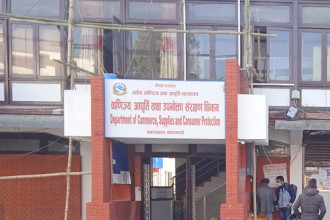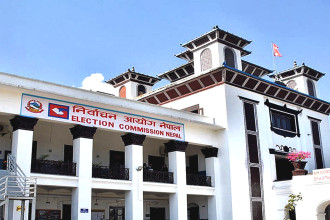
KATHMANDU: The House of Representatives (HoR) ratified the Millennium Challenge Corporation (MCC) grant agreement reached between Nepal and the US government after holding a debate on Sunday evening.
The second meeting of the HoR ratified the MCC compact. Finance Minister Janardan Sharma had presented the proposal seeking the passage of the MCC compact along with descriptive notes. The proposal was passed by the voice note.
Speaker Agni Prasad Sapkota informed that even the descriptive notes were issued by the parliament.
The major opposition, CPN UML, however, continued its protest over non-implementation of its decision. The parliament is scheduled to hold the next meeting on February 30.
Earlier, taking part in the discussion on Finance Minister's proposal seeking ratification of the MCC compact along with descriptive notes, the lawmakers put forth views for and against the MCC compact.
Lawmaker Parbata Bisankhe said the descriptive notes of the MCC compact should be approved in letter and spirit, adding that the US government too should accept it otherwise Nepal should scrap it.
Likewise, lawmaker of Rastriya Janamorcha Durga Poudel argued that the descriptive notes were one-sided and the MCC compact was against the spirit of nationality and national sovereignty.
UML lawmaker Bhim Bahadur Rawal also questioned the one-sided descriptive notes, stating that it created illusion on the country and people.
However, Nepali Congress (NC) whip Pushpa Bhusal believed that MCC would help strengthen Nepal's economy and support in development of infrastructures in Nepal. Bhusal said it while taking part in the deliberation on the proposal, seeking ratification of MCC compact in the second meeting of the House of Representatives (HoR).
She described that a total of 46 countries across the world had inked agreement with MCC and there was not a single case of military alliance relating to the MCC. She also commented that the descriptive notes on the MCC were positive.
Main opposition party CPN UML said that the descriptive notes on the MCC agreement between the government of Nepal and the USA would not have any meaning.
Emerging from the HoR meeting, UML leader Khagaraj Adhikari commented that the descriptive notes were just the tools prepared by the ruling coalition to save its position. UML had also continued its protest, stating that its demand to take action against its 14 expelled lawmakers was not implemented.
What 11-point descriptive notes say Ruling political parties announced 11-point descriptive notes on the much-debated MCC compact, arguing that it is focused solely on economic cooperation and development of physical infrastructures. In the announcement, the ruling parties stated that MCC compact, upon its endorsement, will not be regarded as the agreement having a link to the strategic or military alliance including the US Indo-Pacific Strategy. The auditing will be conducted by the Office of Auditor General; the intellectual property gained from the project will be of Nepal; no agreement will be above the Constitution of Nepal, and the project will be directed as per Nepal's constitution. The descriptive notes were made public after the meeting of the ruling parties held on MCC at Prime Minister's residential office, Baluwatar. In relation to section 2.7, section 5.2 (b.3), section 5.2 (b.4) of the MCC compact, Nepal has the understanding that these provisions are effective only on use of the grant. Similarly, other provisions would not make Nepal mandatory to abide by the existing or the future US laws or policies for any purpose except for use of MCC grant. Similarly, in regard to section 3.2 (b) of MCC compact, it is made clear that the activities to be run from the MCC compact Nepal Development Committee shall be guided by the laws of Nepal. The MCC would not have ownership in the intellectual property right while Nepal will own the entire intellectual property rights and Nepal will fully utilise this. In section 3.5, the implementation papers will be brought into practice, remaining in the ambit of the compact. Also, the activities and funds of the MCA will be audited from Nepal’s Office of the Auditor General. The descriptive note stated that the Constitution of Nepal shall prevail over the compact, which is stated in clause 7.1 of the compact, and implementation of the programme and project would be carried out as per Nepal’s laws and compact. All the movable and immovable properties and land plots of the projects would remain in the ownership of the government of Nepal and its line agencies.
Meanwhile, US officials have spoken to Nepali leaders to assure them that the grant concerns only the country's development. The money is meant to be used for the construction of power transmission lines and improvement of roads in Nepal. (with inputs from RSS) READ ALSO:
What 11-point descriptive notes say Ruling political parties announced 11-point descriptive notes on the much-debated MCC compact, arguing that it is focused solely on economic cooperation and development of physical infrastructures. In the announcement, the ruling parties stated that MCC compact, upon its endorsement, will not be regarded as the agreement having a link to the strategic or military alliance including the US Indo-Pacific Strategy. The auditing will be conducted by the Office of Auditor General; the intellectual property gained from the project will be of Nepal; no agreement will be above the Constitution of Nepal, and the project will be directed as per Nepal's constitution. The descriptive notes were made public after the meeting of the ruling parties held on MCC at Prime Minister's residential office, Baluwatar. In relation to section 2.7, section 5.2 (b.3), section 5.2 (b.4) of the MCC compact, Nepal has the understanding that these provisions are effective only on use of the grant. Similarly, other provisions would not make Nepal mandatory to abide by the existing or the future US laws or policies for any purpose except for use of MCC grant. Similarly, in regard to section 3.2 (b) of MCC compact, it is made clear that the activities to be run from the MCC compact Nepal Development Committee shall be guided by the laws of Nepal. The MCC would not have ownership in the intellectual property right while Nepal will own the entire intellectual property rights and Nepal will fully utilise this. In section 3.5, the implementation papers will be brought into practice, remaining in the ambit of the compact. Also, the activities and funds of the MCA will be audited from Nepal’s Office of the Auditor General. The descriptive note stated that the Constitution of Nepal shall prevail over the compact, which is stated in clause 7.1 of the compact, and implementation of the programme and project would be carried out as per Nepal’s laws and compact. All the movable and immovable properties and land plots of the projects would remain in the ownership of the government of Nepal and its line agencies.
Meanwhile, US officials have spoken to Nepali leaders to assure them that the grant concerns only the country's development. The money is meant to be used for the construction of power transmission lines and improvement of roads in Nepal. (with inputs from RSS) READ ALSO:
Published Date: February 28, 2022, 12:00 am
Post Comment
E-Magazine
RELATED B360 National





